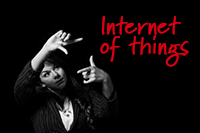Richard Alexander explains why the Internet of Things is fuelling a revolution in business, and warns that specialist skills and a new approach will be critical to realising the opportunities it brings.
According to a common description, the IoT (Internet of Things) is the network of physical objects or “things” embedded with electronics, software, sensors and network connectivity – features that enable them to collect and exchange data.
Make no mistake. These "things" mark the beginning of a revolution for business.
Notice I say business and not IT. IoT is not an IT revolution; it is an IT evolution. For business, however, it brings a seismic shift in businesses’ ability to look inwards, at processes and digital assets and outwards at customers – thereby enabling new revenue opportunities and operating efficiencies. In short, IoT massively increases the resolution of the lens through which businesses are able to look at every aspect of themselves. Of course, looking at oneself means very little if one does not understand what one sees, or how to act on what can be seen.
Data is only data until such time as it can be analysed and transformed into information. Without the ability to analyse, that huge data resource remains untapped. What’s more, as we start to mine the data, pick out the trends and turn the data to information, a virtuous circle begins – one in which the business is able to focus on areas where more data drives better insight and adds more value. In the end, it is insight from information that will fuel the revolution.
IoT as it stands today is predominantly consumer led, and the sectors that can envisage value are those such as healthcare, retail, manufacturing and construction. These are industries that are looking to revolutionise their customer interaction experience – they are considering how the IoT can enhance the services they provide to their customers.
To take advantage of the IoT, however, all these businesses will need to import new skills – they will need partners with expertise in all the technologies that ultimately unlock the value of the data in all these "things". Technologies such as:
- Converged and intelligent network platforms that are able to connect "things" to each other and the systems that control them, be that wired or wireless
- Data centre infrastructure that can scale to accommodate the flood of data, that is agile enough to leverage process changes and powerful enough to analyse all the data in the first place
- Next generation security that provides the visibility and control the business will need to ensure that the "things" do what they are meant to, and don't create holes ready for exploitation
- Business analytics that provide meaningful insight, and that are able to visualise information in a way the business understands
Perhaps more importantly, these partners cannot be ‘technology first’. They must be genuinely customer and business orientated – putting customers at the centre to truly understand their markets.
Only that combination of customer centricity, insight and technical excellence will allow these partners to navigate the complexities inherent in IoT; to identify and seize the value IoT represents for every customer.

